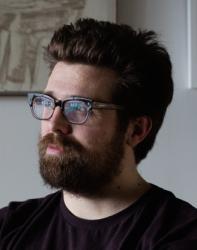Emil Hjörvar Petersen published the first book in his Saga of Survivors trilogy in 2010. The trilogy is a sci-fi/fantasy epic that follows the exploits of the old Viking gods that survived Ragnarok, the Asgardian apocalypse. It basically made Emil a one-man genre in the Icelandic publishing market.
“For many years I felt as if I was on my own,” he reminisces now. “Some days I was filled with confidence; didn’t care what anyone thought and was glad to be free to write whatever I wanted, not stopping to consider whether I was driven by an urge to create high art or entertainment, but freely mixing the two. Other days I felt as if I was fighting a losing battle.”
Emil explains that Icelanders can be hesitant to try new things and that, for a long time, Icelandic publishers doubted that there was any readership for speculative fiction. It led to authors not daring to try their hand at the genre. “At this sort of an impasse,” says Emil, “change needs to come from the fringe—from those able to take chances.”
This change has been a gradual process. “The larger publishers are still being cautious,” Emil says, “publishing works of speculative fiction under the guise of young adult or teen fiction. There’s still very little sci-fi or fantasy being published in Icelandic that’s aimed specifically at adults, aside from my own.”
Cli-fi
In addition to the Survivors trilogy, Emil recently published a new thriller entitled “Víghólar” that mixes elements of Nordic noir with urban fantasy. For him, writing in a language that has little to no tradition of the fantasy genre offers some unique challenges. “Iceland’s speculative fiction tradition is so recent,” he explains, “so some of the necessary vocabulary for the genre is not in place. I often have to hunt down old words, or create new ones. When it comes to the Icelandic language, fantasy and sci-fi writing are uncharted waters, linguistically.”
Despite being something of an oddity on the publishing market, Emil has high hopes for the burgeoning genre. “I’m no prophet,” he smiles, “but my hope is that Icelandic speculative fiction of the future will focus on environmental matters. Climate change and environmental protection has been prominent in speculative fiction in the past few years, and has even gained the moniker ‘climate fiction’ or ‘cli-fi.’ It seems as if many people today don’t realise how urgent a matter protecting the environment is, the dangers that we are inflicting on future generations. Authors of speculative fiction can raise their concerns on these matters. At the same time, I’d like to see Icelandic speculative fiction authors tackle our cultural heritage from different angles, seeking more unorthodox uses of the folklore in their fiction, as well as stories that have nothing to do with Icelandic cultural heritage. The concept of Iceland doesn’t necessarily have to be at the centre of Icelandic spec-fic. Still, it is obvious that Icelandic speculative fiction is here to stay.”
Buy subscriptions, t-shirts and more from our shop right here!
















